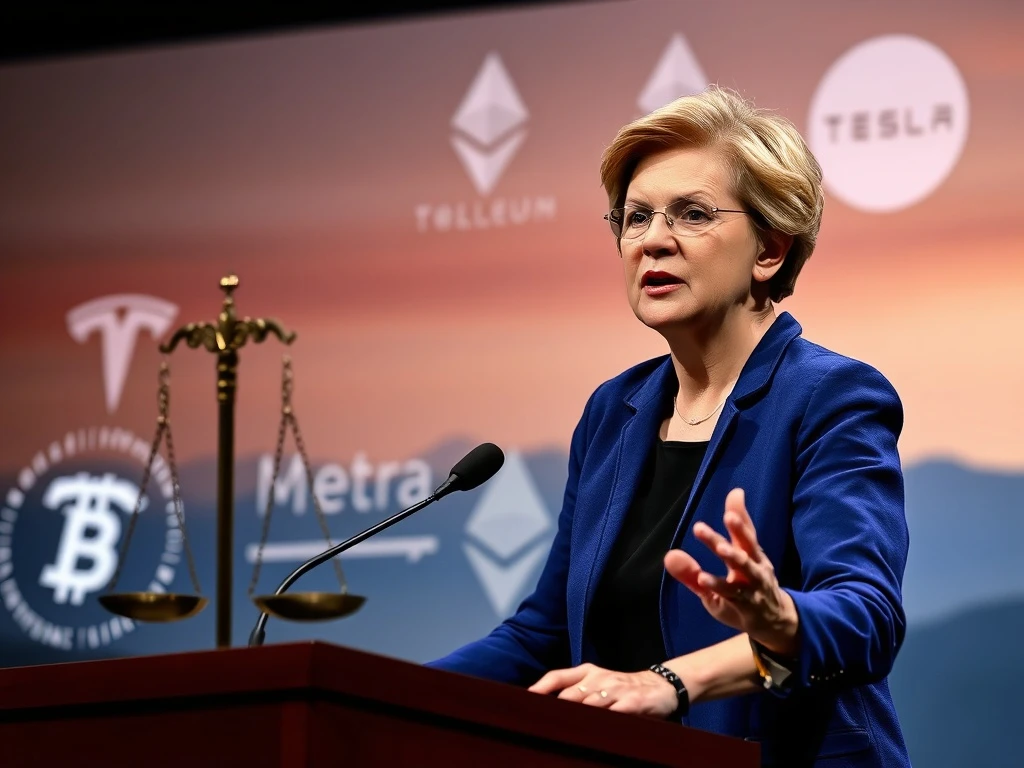Crypto Regulation: Senator Warren Warns of Dire Consequences from CLARITY Bill

The landscape of digital assets is constantly evolving, and with it, the debate around how to best integrate cryptocurrencies into existing financial frameworks. A new legislative push in the United States aims to bring clarity to the crypto market, but not without significant controversy. At the heart of this discussion is the proposed Digital Asset Market Clarity, or CLARITY, Act, which has drawn sharp criticism from prominent figures like Massachusetts Senator Elizabeth Warren. She warns that this bill, rather than providing beneficial guidance, could inadvertently create dangerous loopholes, allowing major corporations like Tesla and Meta to bypass critical oversight. This development has sent ripples through the crypto community, highlighting the ongoing tension between fostering innovation and ensuring robust consumer protection.
Unpacking the CLARITY Act: A Gateway to Regulatory Loopholes?
The CLARITY Act is one of several pieces of legislation the US House of Representatives is set to consider, aiming to establish a comprehensive market structure for digital assets. While the intent is to provide much-needed guidance for the burgeoning crypto economy, Senator Warren has voiced profound concerns about its potential unintended consequences. During a recent Senate Banking Committee hearing, she articulated a stark warning: the bill could empower “non-crypto companies” to sidestep existing securities laws.
Imagine a scenario where a publicly traded giant like Tesla or Meta decides to tokenize its stock. According to Senator Warren, under the proposed House bill, such a move could effectively exempt them from the stringent regulations enforced by the US Securities and Exchange Commission (SEC). Her vivid description – “poof! – it would escape all SEC regulation” – underscores the gravity of her apprehension. This potential regulatory arbitrage is seen as a serious problem, threatening the integrity of the financial system and the safeguards designed to protect investors.
Why are Current SEC Rules Crucial for Investor Protection?
The US financial system relies heavily on the robust framework provided by existing SEC rules. These regulations are designed to ensure transparency, prevent fraud, and maintain fair markets. They mandate comprehensive disclosures from publicly traded companies, offering investors critical information to make informed decisions. Furthermore, the SEC holds companies accountable for their financial reporting and business practices, providing a layer of protection against manipulation and misconduct.
The fear is that if companies can simply move their assets onto a blockchain and thereby bypass these established safeguards, it could create a Wild West scenario. Investors in tokenized assets might find themselves without the same protections afforded to traditional stock market participants. This isn’t just about specific companies; it’s about setting a precedent that could undermine decades of investor protection laws, potentially exposing millions of Americans to heightened risks in a rapidly evolving digital landscape. Ensuring that any new crypto regulation complements, rather than compromises, these foundational principles is paramount.
Senator Warren’s Stance: A Consistent Voice for Consumer Protection?
Senator Elizabeth Warren has consistently positioned herself as a vocal advocate for stringent financial oversight and consumer protection, particularly in the digital asset space. Her concerns about the CLARITY Act are not isolated. She has also raised questions regarding Meta’s influence on lawmakers, especially given the company’s past ambitions to launch its own stablecoin. This highlights a broader theme in her legislative approach: vigilance against potential conflicts of interest and corporate influence in the drafting of new financial regulations.
The ongoing legislative discussions extend beyond just the CLARITY Act. The House is also expected to consider the Guiding and Establishing National Innovation for US Stablecoins, or GENIUS Act, and legislation aimed at restricting the development of a US central bank digital currency (CBDC). This confluence of bills underscores a pivotal moment for crypto regulation in the US, with lawmakers grappling with how to integrate these novel technologies without compromising financial stability or consumer trust. Senator Warren’s persistent questioning aims to ensure that any framework prioritizes public interest over industry interests.
The Broader Debate: Crafting Effective Crypto Regulation
The Wednesday hearing was a significant step in the Senate’s journey toward establishing a comprehensive crypto market structure, a goal set for September. The discussions featured a diverse range of voices, including Ripple CEO Brad Garlinghouse and former Commodity Futures Trading Commission (CFTC) members. Garlinghouse emphasized the immense scale of the crypto economy, stating, “Over 55 million Americans participate in the crypto economy, which equates to a $3.4 trillion market cap today.” He stressed that “A smart regulatory framework for crypto market structure is essential to realize that future, and is long overdue.”
However, the debate also touched upon ethical considerations. Richard Painter, a former chief White House ethics lawyer, invited by Warren, highlighted the critical need to avoid conflicts of interest among lawmakers. “We cannot have the people who are in charge of passing legislation and enforcing legislation, implementing legislation, have conflicts of interest with their official responsibilities. You should be divesting from crypto if you’re going to be regulating crypto,” Painter asserted. Both Warren and Painter specifically pointed to US President Donald Trump’s ties to the crypto industry, including his family-backed business World Liberty Financial and the launch of his memecoin, Official Trump (TRUMP), accusing Republicans of an “industry handout” and ignoring what Warren called Trump’s “corruption.” Recent reports indicating Trump added at least $620 million to his portfolio through crypto investments further fuel these concerns, making the discussion around robust crypto regulation even more complex.
What Does This Mean for Tesla, Meta, and Beyond?
The potential implications of the CLARITY Act, particularly concerning companies like Tesla and Meta, extend far beyond just these tech giants. If the bill were to pass in its current form, it could set a dangerous precedent for how assets are regulated in the digital age. For Tesla, which has previously held significant Bitcoin reserves, or Meta, which explored its own stablecoin project, the ability to tokenize assets and potentially escape SEC oversight could drastically alter their financial operations and public accountability.
This scenario raises critical questions about market fairness and investor confidence. Would traditional investors feel secure if their favorite companies could suddenly operate under a different, less scrutinized regulatory regime simply by leveraging blockchain technology? The challenge for lawmakers is to foster innovation in the blockchain space without creating loopholes that compromise the fundamental principles of financial integrity and consumer protection that have long underpinned the US economy. The future of the Tesla Meta crypto landscape hinges on this delicate balance.
The debate surrounding the CLARITY Act and its potential impact on established SEC rules represents a crucial juncture for the cryptocurrency industry and the broader financial system. Senator Warren’s warnings underscore the vital need for careful consideration of how new legislation could inadvertently undermine existing investor protections. As the House prepares to deliberate on these pivotal bills, the outcome will not only shape the future of crypto regulation but also determine the level of transparency and accountability expected from all market participants, from emerging blockchain startups to established tech behemoths like Tesla and Meta. The imperative is clear: to forge a regulatory path that embraces innovation while steadfastly safeguarding the public interest.









